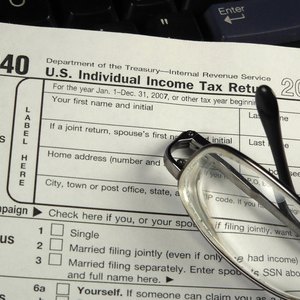
A taxpayer is independent if he or she is not claimed as a dependent on another person’s tax return. If you are independent, you may claim yourself as your own dependent when filing your tax return. If someone else can claim you as a dependent, however, you may not be able to claim yourself. To know if you qualify as another person’s dependent you need to know who qualifies as a dependent under IRS rules.
Children

With the exception of special rules applying to divorced and separated parents, parents may claim their children as dependents. To qualify, a child must be 19 years old or younger. This age is increased to 24 if the child is a student. Children must live with their parents for more than half of the year to be claimed as dependents. Time children spend at school, in the military, on vacation and in medical care facilities counts as time spent at home.
Relatives and Household Members
Relatives or others who provided more than half your support may be able to claim you as their dependent, even if they are not your parent. A relative can be your child, stepchild, foster child or any of their descendants. Siblings, parents, aunts and uncles, in-laws and step-family can all qualify as dependent relatives. Even people who are not related can be considered relative dependents if they lived as a member of the same household. To be claimed, dependent relatives must earn less than a specified dollar amount. This amount is $3,800 for 2012 but may change annually.
Spouses

Contrary to popular belief, your spouse can not claim you as a dependent. When two married people file a joint return, a deduction can be taken for each spouse. This is, in effect, each spouse claiming themselves as a dependent. It is not, however, one spouse claiming the other. If two spouses elect to file separate returns, one spouse may take the exemption for the other only if that spouse had no income and was not a dependent of someone else.
If You Are Claimed
If someone else does claim you as a dependent on her tax return, it does not necessarily mean you do not need to file a tax return. Amounts of both earned and unearned income and special taxes you may owe are what determine whether or not you are responsible for filing your own tax return. If you are required to file a return after someone else has claimed you as a dependent, it is important to remember that you can not claim yourself as a dependent.
References
- Internal Revenue Service: 1040 Instructions
- Internal Revenue Service: Six Important Facts About Dependents and Exemptions
- USA.gov. "Tax Credits and Deductions." Accessed June 16, 2020.
- IRS. "Module 8: Claiming Child Tax Credit." Accessed June 16, 2020.
- IRS. "Publication 503 Child and Dependent Care Expenses." Accessed June 16, 2020.
- IRS. "Earned Income Tax Credit Income Limits and Maximum Credit Amounts." Accessed June 16, 2020.
- IRS. "Filing Status 2." Accessed June 16, 2020.
- IRS. "Tax Tutorial Module 4: Dependents." Accessed June 16, 2020.
- IRS. "Publication 501 (2018), Dependents, Standard Deduction, and Filing Information." Accessed June 16, 2020.
- IRS. "Dependents." Page 2. Accessed June 16, 2020.
- IRS. "Qualifying Child of More Than One Person." Accessed June 16, 2020.
- IRS. "A 'Qualifying Child." Accessed June 16, 2020.
- IRS. "Table 2: Qualifying Relative Dependents." Page 1. Accessed June 16, 2020.
- IRS. "Form 2120, Multiple Support Declaration." Accessed June 16, 2020.
- IRS. "Answers to Frequently Asked Questions for Registered Domestic Partners and Individuals in Civil Unions." Accessed June 16, 2020.
- IRS. "Dependents 3." Accessed April 7, 2020.
- IRS. "IRS Provides Tax Inflation Adjustments for Tax Year 2019." Accessed June 16, 2020.
Writer Bio
Writing professionally since 2008, Michelle Miley specializes in home and garden topics but frequently pens career, style and marketing pieces. Her essays have been used on college entrance exams and she has more than 4,000 publishing credits. She holds an Associate of Applied Science in accounting, having graduated summa cum laude.

